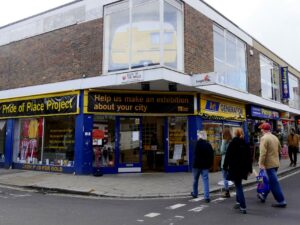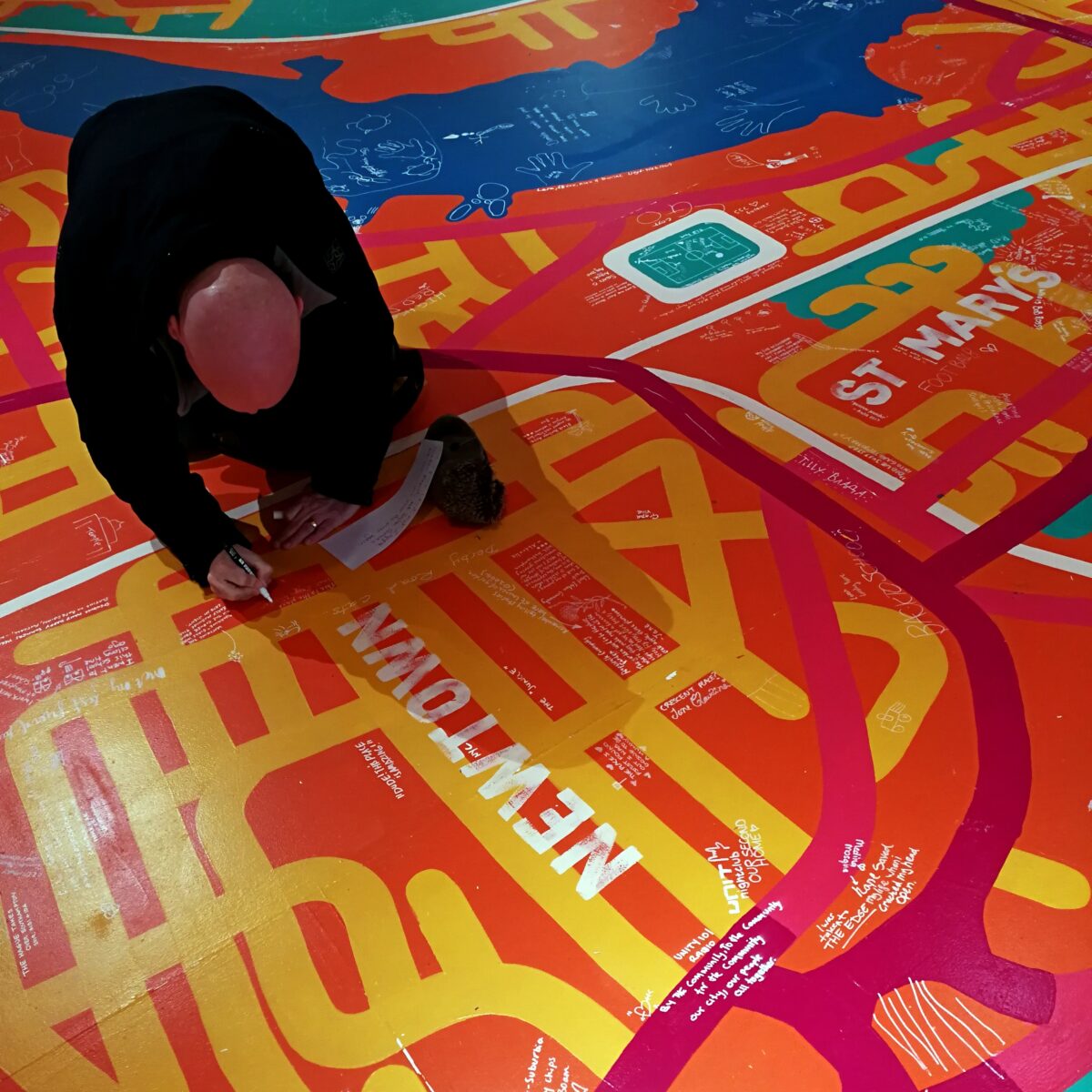A few weeks ago the Southampton Culture Trust announced it is now to be known as Southampton Forward.
The Facebook post said it was exciting news. I was excited for news too, I had been waiting months to find out what was happening.
I was looking forward to an explanation of what the trust was for – its vision, the way forward, what we could expect to happen? How the city would benefit? How the money was going to be spent? And, how people could get involved?
I followed the link to its website. Oh…’we are working hard behind the scenes to get the website up and running’.
That was disappointing.
For an organisation with the public funding to employ communications and marketing professionals, it seemed a bit chaotic. Still no real news then.
It’s not months, it’s now years since we were marched up the City of Culture hill. Four and a half years since the council announced the Southampton Cultural Development Trust was being wound up to create a better new ‘arms length body’ to take the city’s cultural sector forward.
Where had I heard that name before – Southampton Forward? Ah yes, the beginning of February: the SO25 legacy conference.
Southampton Forward – a day I, and many others, won’t get back. Two hundred people sat in silence and darkness while important guest speakers talked importantly on the stage at the MAST theatre.
Many city people had just spent a lot of time talking about what Southampton needed during the City of Culture bid, the city’s largest community consultation ever, apparently. So it seemed a touch insulting to be talked at about what Southampton needed now by people – some of whom at least – had dropped in for the day from London, Leeds, Liverpool, Birmingham, and beyond.
They talked nebulously about ‘the change’, and ‘leading the change’.
The new Trust hadn’t been launched yet, although the conference was chaired by its new chair. The programme gave her addresses as London and the New Forest. No-one would give even a paraphrase of what had actually been in the SO25 bid we had pushed up the hill – it wasn’t then publicly available.
There was no real discussion. All communication with the stage was via a mobile app, if you could get Wi-Fi. Questions to the panel had to be vetted and approved. It felt like any question about what was actually going to happen in Southampton was avoided, kept under wraps.
It all felt very carefully controlled, as if we were simply the audience for someone’s TV show. And no-one was talking about the money.
There had been a loser’s City of Culture Grant of £125, 000. Chicken feed compared to the £11.5m to the city that the Arts Council had announced three months before the conference. What was the money for – how would it be spent? No-one was letting on.
The Southampton Forward website says it is an independent charitable trust ‘working in collaboration with key stakeholders and partners to strengthen culture, communities and place across the city.’ Good corporate copywriting.
But what does it mean by independent? And what is it independent of?
The nine trustees and company directors include the general managers of West Quay and the Marlands shopping centres, the council leader (one other councillor can also be appointed), the council chief executive, and three Southampton University and Solent University nominees.
Three of the directors are also on the board of Go Southampton, which represents city centre businesses.
The website points to the council’s events and festivals strategy, and the council’s tourism strategy, so maybe it isn’t very independent of the council either.
The board represents the interests of institutions, students, businesses, and tourists. It’s independent of most of the population of Southampton, that’s for sure. There’s no mention of the trust working with, supporting, and certainly not involving local people, or those who make this creative and cultural city tick. We aren’t stakeholder in the trust or partners of it.
Perhaps the Trustees that represent those interests think they speak for the city’s people too, or think they know what is best for us. Or maybe its just not about us, and that’s ‘the change’ they had been talking about.
It wasn’t always like this.
Over the last decade or more, Southampton has seen a growing capacity and new networks in the arts, heritage and culture sector. It has led to greater engagement, a sense of community, and an emerging voice, however imperfect, for creative and cultural Southampton.
There was SHAPE, chaired by Stephen Foster from John Hansard, one of the city’s strategic partnerships. It brought together people to draw up the city’s first cultural strategy, and sowed the seeds of cultural networks. The CHAOS network, driven by SoCo, has brought together artists and arts administrators on a monthly basis for years.
The CHAOS conference in 2016, funded by the Cultural Development Trust, and was a real grass roots affair drawing inspiration from the brilliant writer, theatre and arts-maker, Stella Duffy. In 2018 there was the Creative Network South regional conference.
The British Art Show Fringe commission brought together artists and creatives to collaborate and deliver new work. It provided an amazing city display of talent and creativity. People came together to look for ways of supporting and developing the music scene, especially in hard times. There were craft, maker and community artist initiatives.

The Showcase’s Make Your Mark and the Caravan Gallery ‘Pride of Place’ projects involved enormous numbers of Southampton people in sharing their personal Southampton, their art and creativity.
Organic cultural events and festivals provided a platform for local artists and performers, and fostered collaborations between both artists and organisations. The funding these local projects secured, and the commissions and bookings that resulted, supported local artists at a grass roots level.
The Cultural Development Trust, which had won the funding for the Fringe, also helped individual artists and groups make bids for funding. It began to look at the music sector, and worked on visitor and audience strategies. Of course, the funding climate and ‘busy people syndrome’ limited what could be achieved; not everything was successful. But it helped create change and progress, and gave the city the confidence to bid for City of Culture.
In 2019 the Culture City conference, funded by the Cultural Development Trust, brought together artists and organisations from across the city. It aimed to create an agenda to help move things on, capitalise on the growing capacity and networks, and prepare for a City of Culture bid. Committed local creatives, artists and administrators were working together to take the city forward.
Except nothing moved forward.
The month before the conference the city council, the universities, and the Arts Council had met privately and decided to sink the Cultural Development Trust. They planned to create a new culture body ‘at arms length to the council’. This is exactly what the Cultural Development Trust had been, and to this day there is no new body – just a series of personnel and name changes piggy-backing on the original trust.
Why? Was it one of those behind-the-scenes power games? No-one one really explained why. The chair and chief executive (who had driven so much forward) was gone.
Bizarrely, it had just agreed a new plan for the future – drawn up with and signed up to by all those same institutions who decided to sink it. Maybe it was too independent, or working too closely with the sector and not the institutions. Who knows?
Leader of Southampton City Council Satvir Kaur was the closing speaker at the Culture City Conference. She thanked everyone for coming. Many people were at the conference to hear about the next steps. She said that something new would be set up, and when the council had decided what that was, someone would be in touch.
Again, it felt like all the commitment and energy in the room was flushed straight down the pan in a brilliant stroke of disempowerment.
There was limbo for many months while the Council sorted out what it wanted. Then rumours began to circulate about a bid committee of hand-picked people and some working groups. It was announced that there was a new chief executive to lead a bid.
While Bradford and others worked for years on preparing their City of Culture bids, Southampton was playing catch-up, as a result of the months wasted on the power shenanigans. Hampered now by the pandemic as well, there was a self-imposed sense of urgency over the whole process.
Then after the bid failed in May 2022 there was more silence. Nothing was said for nine months, except that the CEO was now staying on. Bid ‘ambassadors’ were left hanging, there was no city de-brief, no holding communication. Go Southampton’s 2021 Re:Claim festival, touted as a new annual event turned out to have been a one-off, presumably to impress the City of Culture judges.
Once again, any momentum and commitment built up with local people had dissipated. It is as if the people of Southampton are viewed as a tap that can be turned off and on when it suits the powers-that-be.
It feel like the interests of the city and its people are secondary to these institutions and their games. We can wait however long it takes while the city’s important players sort out their agendas.
We can be told, “go home we’ll be in touch when we’re ready”.
We can sit and watch as new people constantly re-invent the wheel.
We can be involved – but only when we are invited.
Southampton Forward is shaping up as a corporate, unaccountable and undemocratic body. The trust, and its well-funded national portfolio organisations, covering art, music, writing, and dance – now seem to have the city all wrapped up.
The ‘cultural quarter’ really has become the centralised head office of art and culture in the city. The institutions have seen off a developing arts and cultural movement, and its sometimes unorganised, anarchic, but inclusive grass roots voice, which was a decade in the growing.
No doubt, when it’s ready to let us know, Southampton Forward will give us the full vision it’s decided on. It will finally tell us what it is for and what it does that requires marketing, operations, communication, and finance managers. We will be able to read its Board minutes and see exactly what it does with our money.
No doubt this new trust will have built in a way for everyone to share in discussing, creating and building a way forward for the city – and not just the chosen and the institutional elite.
No doubt we will see Southampton Forward promoting and supporting the real cultural heritage – the everyday lives we live, from Millbrook to Weston – and not just the publicly-funded and officially approved.

I’m not holding my breath.
Charlie Hislop ran the non-profit Southampton Festivals for a decade. was a member of the Southampton Cultural Development Trust from 2015 to early 2019, when he stood down as part of a Board refresh, a few months shortly its closure was announced.
Main photo: Make your Mark project, Solent Showcase. Charlie Hislop
- In Common is not for profit. We rely on donations from readers to keep the site running. Could you help to support us for as little as 25p a week? Please help us to carry on offering independent grass roots media. Visit: https://www.patreon.com/incommonsoton

